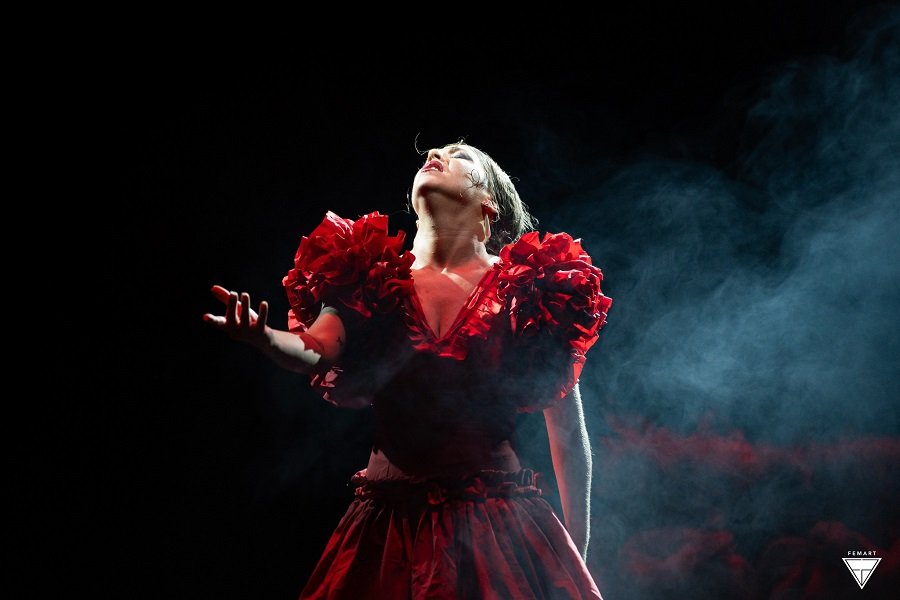By: Gili Hoxhaj
“Carmen” is truly captivating when it’s entirely Spanish, and this was clearly evident in Pristina. The “FemArt” audience embraced this interpretation, welcoming it with open arms. This wasn’t a “Carmen” emerging from a royal palace – the stage, with its simplicity, communicated a Carmen born from intense experiences. She was revealed as a Carmen whose identity is defined by freedom. Everything about her was passion. She demonstrated that everything struggles within the same fate – in the same attempts, when you must fall hard to the ground to make a lasting impact. A way to resist fate itself. With this performance, the 12th edition of “FemArt” sent its own message: the fight for love and freedom is the only battle that never ends. Even when one love ends, another is born. “Carmen,” performed by the Barcelona Flamenco Ballet, arrived in “Klan Arena” full of Spanish flair on the night the festival kicked off 30 events centered around femicide and solidarity. Dressed in vibrant colors, like a story filled with drama, each scene painted a new day on the horizon of history. Through the stage, it survived time, an operatic performance that, in its early years, was not well-received, mainly because it dared to portray a seductive woman who answers to no one but love – not even when threatened. The performance wasn’t just about love – it was a continuous battle where peace is fragile. And with the tragic end, everything comes to rest. “Without peace, there is no security. The goal is a call for peace and the need for greater stability. It’s also a call for sisterhood, for overcoming both internal and external barriers, because the foundation of feminism is solidarity and sisterhood. We wanted to highlight this, to inspire love and understanding – to empathize with peace,” said Zana Hoxha, the director and founder of “FemArt,” when addressing the media. But let’s not focus solely on Carmen’s love story. The scenes were universal, found everywhere. Just like the tragic ending based on jealousy and fate, where jealousy can’t be overcome, even by love. What stood out most for me was the message the characters conveyed when they were alone on stage. Especially Carmen, who swirled in a cosmos where joy and sorrow are inseparable. The sound of the heels created power, just like the instruments in the performance. Carmen was certain when she held her ground. In a rhythm-driven movement, the dancers were perfectly synchronized. It was as if she was directing everything. When in a duet, Carmen gives all of herself to maintain the passion of love. But when she’s alone, her movements become a deep search for freedom and autonomy. This is a Carmen who defends freedom, a Carmen who values it. A rebel, immersed in her own world. The rhythmic music, with elements of traditional Spanish melodies, almost effortlessly convinces you that it’s a hymn to freedom. Her red dresses serve her nature, challenging everything that comes her way with a playful defiance.
Dancer Jud Judith seemed to have lived Carmen’s story in another world. And even more, she found much of Carmen within herself. That’s why she performed her role so naturally and with full heart. “When I play ‘Carmen,’ I’m bold, sometimes I’m sad, and sometimes I’m happy. Carmen is like me, but in another world,” said Jud Judith after her performance at FemArt in Pristina. Don José is stable and unwavering when he is alone. His demeanor is mostly stoic. Unlike Carmen, who struggles and bends. Don José, played by the ballet dancer David Gutiérrez Molina, is not one to just perform on stage and leave the impression to the audience. He becomes one with them. When inviting applause, he always seeks more from them. Often, this would lead to laughter, along with the applause. He describes the audience as warm and wonderful. Regarding “Carmen,” he says it has adapted to the times.
“It’s a new ‘Carmen,’ with a focus on women, because we think it’s relevant and speaks to gender violence,” he told journalists. The Barcelona Flamenco Ballet didn’t leave the audience of FemArt with the tragedy of Carmen’s death. They returned to the stage with a song, bringing a sense of celebration to the festival, which is expanding its audience. The first day of FemArt was a celebration. But not everything will be a celebration. Many events call for reflection on the wrong steps taken in the pursuit of equality and justice. Many calls need to be addressed. Through the festival, FemArt makes it all possible. On another level, it can be achieved—perhaps with more solidarity.

